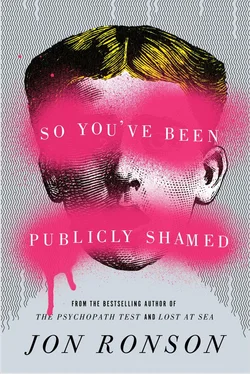—
Ted Poe’s punishments were sometimes zany — ordering petty criminals to shovel manure, etc. — and sometimes as ingenious as a Goya painting. Like the one he handed down to a Houston teenager, Mike Hubacek. In 1996, Hubacek had been driving drunk at one hundred miles per hour with no headlights. He crashed into a van carrying a married couple and their nanny. The husband and the nanny were killed. Poe sentenced Hubacek to 110 days of boot camp, and to carry a sign once a month for ten years in front of high schools and bars that read I KILLED TWO PEOPLE WHILE DRIVING DRUNK, and to erect a cross and a Star of David at the scene of the crash site, and to keep it maintained, and to keep photographs of the victims in his wallet for ten years, and to send ten dollars every week for ten years to a memorial fund in the names of the victims, and to observe the autopsy of a person killed in a drunk-driving accident.
Punishments like these had proved too psychologically torturous for other people. In 1982 a seventeen-year-old boy named Kevin Tunell had killed a girl, Susan Herzog, while driving drunk near Washington, D.C. Her parents sued him and were awarded $1.5 million in damages. But they offered the boy a deal. They would reduce the fine to just $936 if he’d mail them a check for $1, made out in Susan’s name, every Friday for eighteen years. He gratefully accepted their offer.
Years later, the boy began missing payments, and when Susan’s parents took him to court, he broke down. Every time he filled in her name, he said, the guilt would tear him apart: “It hurts too much,” he said. He tried to give the Herzogs two boxes of prewritten checks, dated one per week until the end of 2001, a year longer than was required. But they refused to take them.
Judge Ted Poe’s critics — like the civil rights group the ACLU — argued to him the dangers of these ostentatious punishments, especially those that were carried out in public. They said it was no coincidence that public shaming had enjoyed such a renaissance in Mao’s China and Hitler’s Germany and the Ku Klux Klan’s America — it destroys souls, brutalizing everyone, the onlookers included, dehumanizing them as much as the person being shamed. How could Poe take people with such low self-esteem that they needed to, say, rob a store, and then hold them up to officially sanctioned public ridicule?
But Poe brushed the criticisms off. Criminals didn’t have low self-esteem, he argued. It was quite the opposite. “The people I see have too good a self-esteem,” he told The Boston Globe in 1997. “Some folks say everyone should have high self-esteem, but sometimes people should feel bad.”
Poe’s shaming methods were so admired in Houston society that he ended up getting elected to Congress as the representative for Texas’s Second Congressional District. He is currently Congress’s “top talker,” according to the Los Angeles Times , having made 431 speeches between 2009 and 2011, against abortion, illegal immigrants, socialized health care, and so on. He always ends them with his catchphrase: “And that’s just the way it is!”
—
“It wasn’t the ‘theater of the absurd.’” Ted Poe sat opposite me in his office in the Rayburn House Office Building in Washington, D.C. I’d just quoted to him his critic Jonathan Turley’s line—“using citizens as virtual props in his personal theater of the absurd”—and he was bristling. He wore cowboy boots with his suit — another Poe trademark, like the catchphrase and the shaming. He had the look and mannerisms of his friend George W. Bush. “It was the theater of the different ,” he said.
The Rayburn building is where all the congressmen and congresswomen have their offices. Each office door is decorated with the state flag of the congressperson who is inside: the bald eagles of Illinois and North Dakota and the bear of California and the horse’s head of New Jersey and the strange bleeding pelican of Louisiana. Poe’s office is staffed by handsome, serious-looking Texas men and tough, pretty Texas women who were extremely nice to me but totally ignored all my subsequent e-mail requests for clarifications and follow-up interviews. Although Poe ended the interview by warmly shaking my hand, I suspect that the moment I left the room he told his staff, “That man was an idiot. Ignore all future e-mail requests from him.”
He recounted to me some of his favorite shamings: “Like the young man who loved the thrill of stealing. I could have put him in jail. But I decided that he had to carry a sign for seven days: I STOLE FROM THIS STORE. DON’T BE A THIEF OR THIS COULD BE YOU. He was supervised. We worked all the security out. I got that down to an art for those people who worried about security. At the end of the week the store manager called me: ‘All week I didn’t have any stealing going on in the store!’ The store manager loved it.”
“But aren’t you turning the criminal justice system into entertainment?” I said.
“Ask the guy out there,” Ted Poe replied. “He doesn’t think he’s entertaining anybody.”
“I don’t mean him,” I said. “I mean the effect it has on the people watching.”
“The public liked it.” Poe nodded. “People stopped and talked to him about his conduct. One lady wanted to take him to church on Sunday and save him! She did! ” Poe let out a big high-pitched Texas laugh. “She said, ‘Come with me, you poor thing!’ End of the week, I brought him back into court. He said it was the most embarrassing thing that had ever happened to him. It changed his conduct. Eventually, he got a bachelor’s degree. He’s got a business in Houston now.” Poe paused. “I have put my share of folks in the penitentiary. Sixty-six percent of them go back to prison. Eighty-five percent of those people we publicly shamed we never saw again. It was too embarrassing for them the first time. It wasn’t the ‘theater of the absurd,’ it was the theater of the effective . It worked.”
—
Poe was being annoyingly convincing, even though he later admitted to me that his recidivism argument was a misleading one. Poe was far more likely to sentence a first-time offender — someone who was already feeling scared and remorseful and determined to change — to a shaming. But even so, I was learning something about public shaming today that I hadn’t anticipated at all.
It had started earlier that morning in my hotel room when I telephoned Mike Hubacek, the teenager who had killed two people while driving drunk in 1996. I had wanted him to describe the feeling of being forced to walk up and down the side of the road holding a placard that read I KILLED TWO PEOPLE WHILE DRIVING DRUNK. But first we talked about the crash. He told me he spent the first six months after it happened lying in his prison cell, replaying it over and over.
“What images did you replay?” I asked him.
“None,” he replied. “I had completely blacked out during it and I don’t remember anything. But I thought about it daily. I still do. It’s a part of me. I suffered a lot of survivor’s guilt. At the time, I almost convinced myself I was in a living purgatory. I lived to suffer. I went more than a year and a half without looking in a mirror. You learn to shave using your hand as a guide.”
Being in purgatory, he said, he had resigned himself to a lifetime of incarceration. But then Ted Poe unexpectedly pulled him out. And he suddenly found himself walking up and down the side of the road holding that placard.
And there on the side of the road, he said, he understood that there was a use for him. He could basically become a living placard that warned people against driving drunk. And so nowadays he lectures in schools about the dangers. He owns a halfway house — Sober Living Houston. And he credits Judge Ted Poe for it all.
Читать дальше












